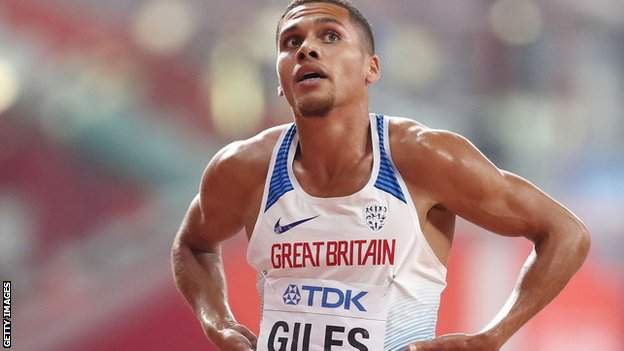

The reduction of drug testing during the coronavirus pandemic has been a “let-down”, “frustrating” and “disheartening”, according to several athletes.
In March, both UK Anti-doping (Ukad) and the United States Anti-Doping Agency (Usada) publicly announced a reduction in their testing programmes.
“It put a question mark on clean sport in the country and the trust of the organisation,” Britain’s 4x400m relay world silver medallist Laviai Nielsen told BBC Sport.
“Anti-doping is such a grey area anyway,” she added. “You would hope that you do have it in the back of your mind that you could get tested at any time.”
Ukad chief executive Nicole Sapstead warned that athletes and coaches were “strongly mistaken if they believe the rules can be broken amid the coronavirus outbreak”.
Despite those assurances, 4x100m relay world champion Adam Gemili called the reduced level of testing “ridiculous”.
The USA’s two-time Olympic triple jump champion Christian Taylor said it was “frustrating and disheartening” to hear about Usada’s announcement.
“We’re already battling the constant battle of people trying to find loopholes and grey areas and the frustrating part is [anti-doping agencies] said ‘here’s a window that you can take advantage of’,” he told BBC Sport.
“I believe we still have to at least give the impression that testing is going to take place. If they know they’re not going to be tested, we’re really opening up the doors to difficult times. Why say anything at all?”
Athletes are also concerned about being tested in line with social-distancing guidelines.
Gemili has been training in Florida, where he was tested by the World Anti-Doping Agency in May.
“I was like… ‘do I open the door?’ But because it’s anti-doping I was like, ‘yeah, I have to.’ I just assumed because anti-doping is here, they’re allowed to be here. He stood far away from me, and he was in and out in 20 minutes.”

European 800m bronze medallist Elliot Giles has not been tested since December. His father – who he lives with – has recently recovered from coronavirus, and Giles is worried about testers coming into people’s homes.
“It’s hugely important that we think about not only the athletes’ circumstances but who the athletes are living with. Some athletes don’t have the financial backing to move away from home and they may well have a vulnerable person in their household,” he said.
“It’s quite scary in the sense that if you allow somebody into your house, you could be jeopardising their life.”
Refusing a drug test can result in a four-year ban for athletes.
Ukad says when testers arrive at an athlete’s home, they will ask if anyone in the household is high-risk or self-isolating and then make the decision on whether to proceed.
But Gemili says it will be difficult for athletes to say no.
“Find me an athlete that says ‘no, no testing’… because that’s your career basically. If anti-doping show up at the door you let them in. I’m sure there’ll be special cases made but as athletes we don’t know.”
Taylor is one of 15 Olympians to have taken part in an ongoing ‘virtual drug testing’ trial by Usada.
“It was a very simple procedure but also very accurate. We set up a Zoom meeting and walked through the procedures and it was extremely easy. It has been really well thought-out.”
Athletes are sent a testing kit which they self-administer having set up a camera outside their bathroom door. Samples are sealed and left for collection and analysis.
Taylor hopes the virtual testing can become an alternative in case of emergencies like a potential second-wave of Covid-19.
“I don’t see a better way of keeping the sport clean while keeping everyone safe. It’s just greater peace of mind. I wish this was a global thing.” – bbc.com